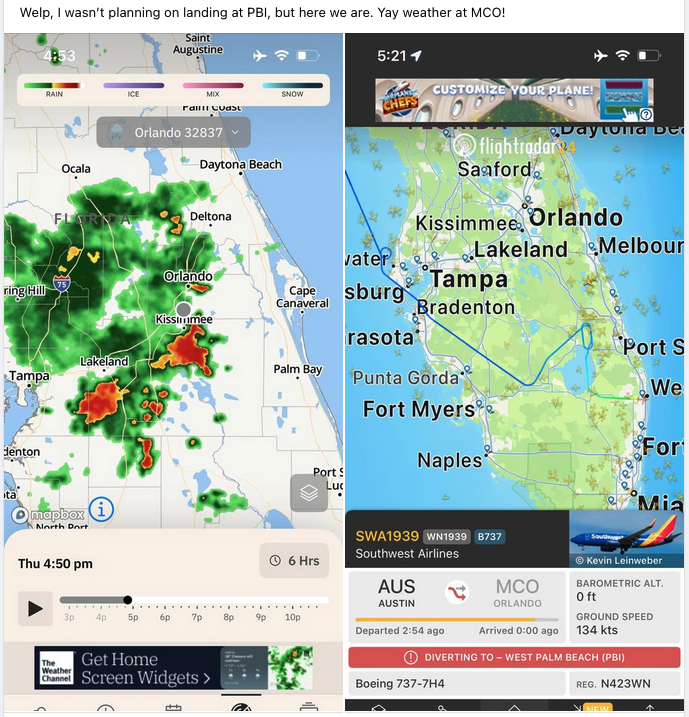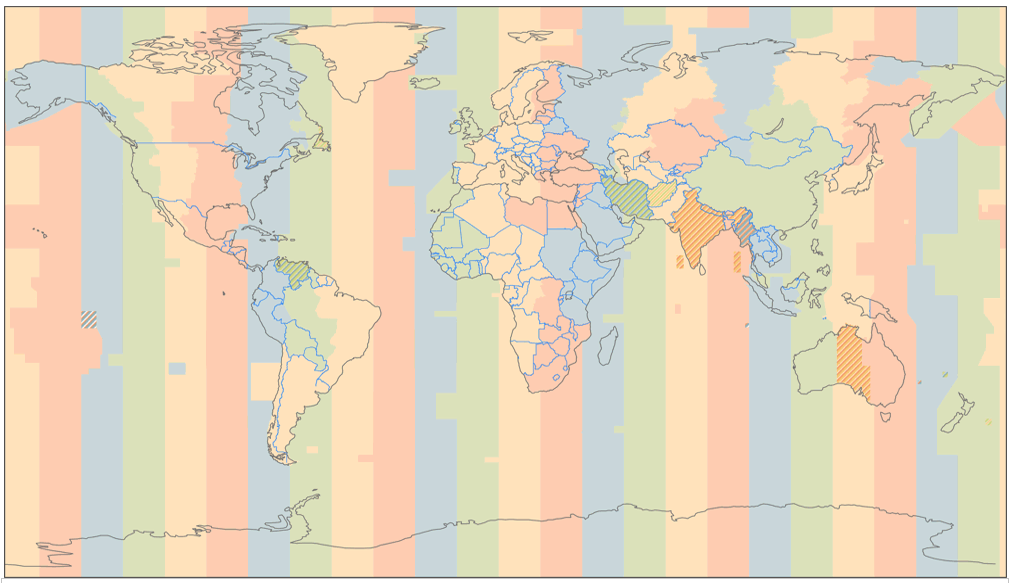Last week, I went to one of my favorite places in the world, Schlitterbahn Water Park, in New Braunfels, TX. Joe, my husband, stayed home this trip, so I went with a friend of mine from high school, Chris, who lives in the Dallas area.
On the day I went home, Thursday, August 1st, I sat pretty much all day:
- I sat in the restaurant, eating breakfast
- I sat in Chris’s car for an hour to go back to AUS
- I sat at Gate 16 for an hour and a half
- I sat on the plane, not for the planned 2 hours and change, but nearly 4 hours, because MCO had “weather” (MCO has weather all the time in the summer). The pilot and ATC tried to find an open window for us to land, but it never happened (MCO was at a ground stop for a while). So we diverted to Palm Beach.

- Finally, after refueling the plane and the storm continuing on its way, we landed at MCO a few minutes before 8 pm (I was originally supposed to land at MCO at 5:35 pm)
Except for a little bit of walking to/from/through a few places, I pretty much sat on my backside all day long. And yet, I was completely wiped out. I was thrilled that Joe had dinner ready to reheat when we got home, and I think I was in bed by about 10:30 p.m. (I’m typically a night owl). I couldn’t stay up for another minute; I was just exhausted.
Why are we so tired after traveling?
You’d think that, after doing a whole lot of not much, we would be so energized after traveling, right? Instead the opposite is true and we have what’s called “travel fatigue.” Why is that?
Turns out there are a few reasons:
Lack of sleep
This one’s a no-brainer. If you have an early flight, you’re going to have to wake up early – possibly earlier than you’re used to. So when you wake up, you’re already behind the 8 ball in terms of tiredness because you most likely didn’t get enough sleep the night before you travel.
Time zones

PC:Tobias Jung [CC BY-SA 4.0], via map-projections.net
Stress
Even if you’re the most well-prepared traveler, flying is stressful, whether you think it is or not. You have to worry about getting to the airport on time, getting to your gate without incident, and hoping your flight isn’t delayed or cancelled (or, ahem, rerouted to PBI for an hour). Passengers also tend to be hyper-vigilant, be it ensuring they’re not bumping into others with their carry on or back pack, making sure no one takes their stuff, figuring out where things are and following the directives of TSA officers, etc.
All that stress for hours at a time can wear a person out.
Lack of mental stimulation
Unless you’re watching a particularly interesting video, air travel, especially for hours on end, can be boring. And what happens when you get bored? You get sleepy,
Unusual movements
The human body isn’t typically used to turbulence, to say nothing of the noise, shuddering, speed changes, pressure changes and vibrations you feel on a plane. You’re not aware of it, but your body is constantly trying to stabilize itself. After a few hours of these thousands of micro-muscle movements, you’re going to be fatigued from it.
Poor nutrition
When you go on vacation, your eating schedule is usually pretty messed up. You may eat full breakfasts when you usually just have a cup of coffee and a piece of toast. Or maybe you’re eating fattier foods than you do at home.
Furthermore, unless you’re flying first or business class, the food you eat on the plane is likely not as healthy as it is convenient.
So if you typically eat a well-balanced diet and have now eaten more or differently than you usually do for days on end, and then just cookies and chips on the plane, your body is going to respond with a lower energy level.
Flying affects your body
Flying in a plane isn’t the same as walking from Point A to Point B. You don’t move much, which causes circulation slowdowns. You’re also in a pressurized cabin that’s kept about 15% more dry than ground air, which can lead to dehydration. And since airplane cabins are kept at a lower pressure than sea level, you breathe less oxygen, which means your brain is receiving slightly less oxygen than usual.
So you get off a plane with dehydration, slower circulation, and some oxygen deprivation. If your body is typical, it knows how to stabilize these issues, but doing so takes energy. So again, you’re exhausted.
Want to comment on this post? Great! Read this first to help ensure it gets approved.
Want to sponsor a post, write something for Your Mileage May Vary, or put ads on our site? Click here for more info.
Like this post? Please share it! We have plenty more just like it and would love it if you decided to hang around and sign up to get emailed notifications of when we post.
Whether you’ve read our articles before or this is the first time you’re stopping by, we’re really glad you’re here and hope you come back to visit again!
This post first appeared on Your Mileage May Vary


2 comments
Add hypoxia. The air on the plane is equivalent to 8,000 ft. above sea level so like a mountain.
Getting up early to catch the flight also can be tiring.
No need to add anything; both were mentioned in the piece.